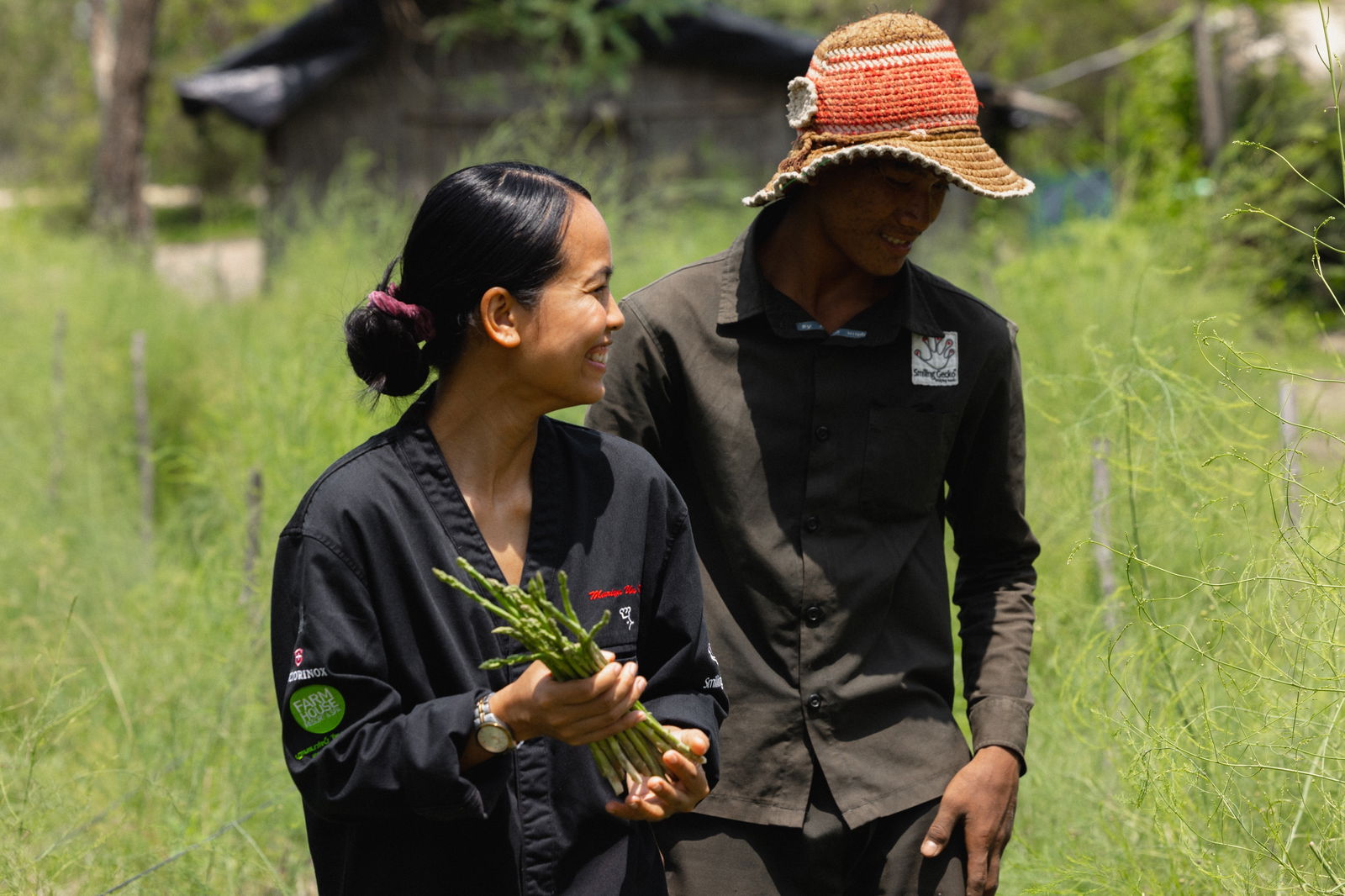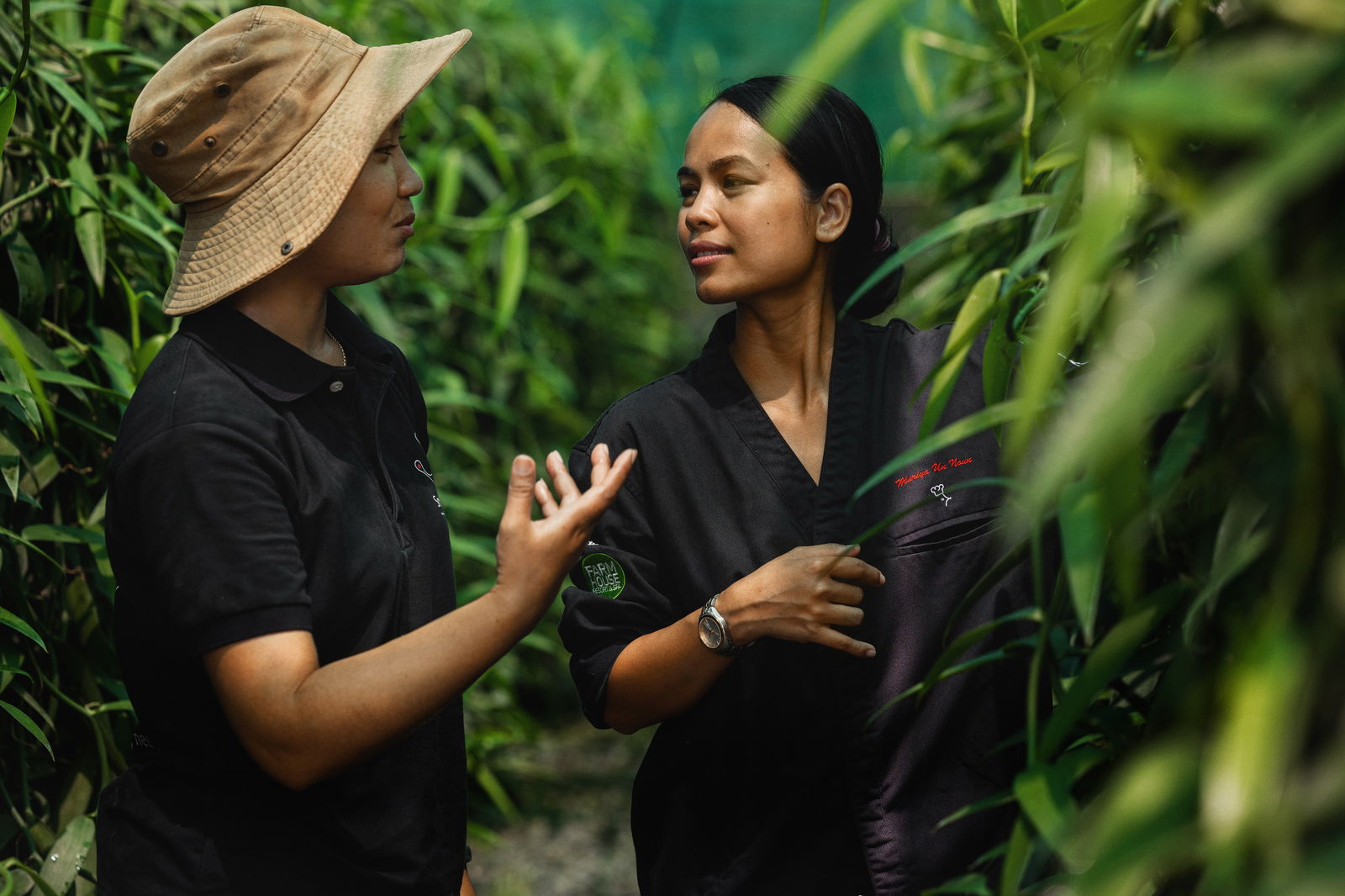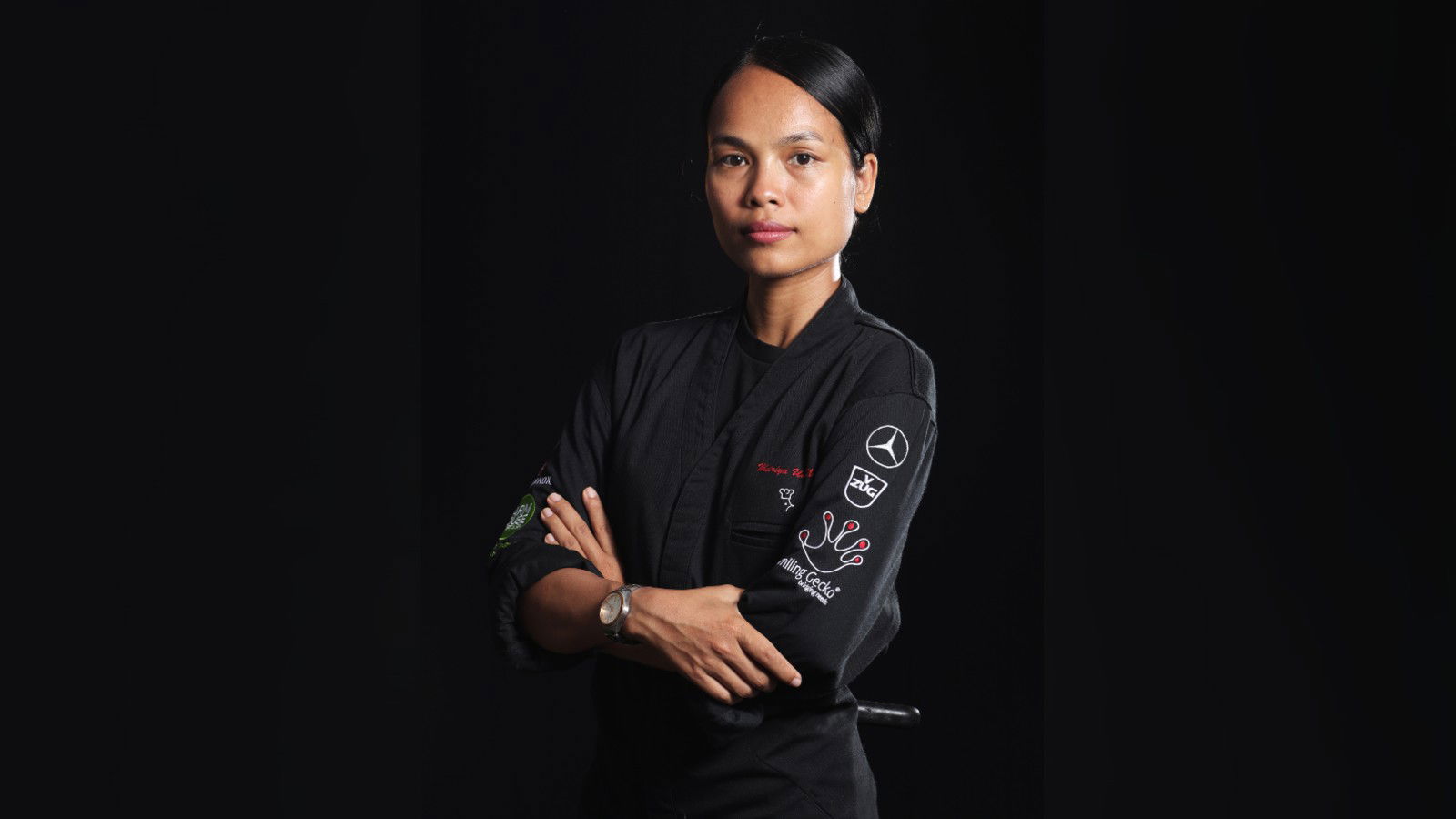share on
From a childhood shaped by poverty and perseverance to leading the kitchen at Smiling Gecko Farmhouse Resort & Spa, Mariya Un Noun is redefining what leadership, inclusion, and purpose can look like in Cambodia’s culinary scene.
Feature by Priya Sunil and Umairah Nasir.
Mariya Un Noun (pictured above) still remembers the first dish she ever made. A simple fish soup, prepared over a wood fire with her mother, using scraps of fish and a few herbs. “It wasn’t just nourishment, it was a moment of comfort in a life where comfort was rare,” she shares. That bowl of soup became her anchor, carrying her through years marked by hardship.
Today, Mariya leads Restaurant UN at Smiling Gecko Farmhouse Resort & Spa as its Culinary Director and Executive Chef. Her journey has taken her from the garment factories of Cambodia to training with some of the world’s most respected chefs in Switzerland. Cooking, she says, gave her a sense of purpose when little else made sense. “Even in the darkest times, it gave me hope.”
What defines Mariya’s leadership now is not just skill, but heart. She leads with empathy, remembering what it felt like to be silenced and overlooked. Her mission, she said is to: “ensure that every person in my kitchen feels they have a place and a purpose”.
That mission is reflected in every plate served, and every young chef she mentors.
As Mariya recounts in this interview, the path to where she is today was anything but easy, shaped instead by purpose, resilience and gratitude.
Q You’ve lived through pain and hardship that many can’t imagine; yet today, you lead a fine-dining kitchen with strength and grace. Looking back, what kept you going in your darkest moments, and how have those experiences shaped the kind of leader you are now?
a. What inner qualities or values do you credit most for this transformation?
Looking back, I believe what kept me going was an unspoken conviction that life could, and should, hold more than struggle. Even in the darkest times, when I was working long hours in the garment factory or suffering abuse as a child, cooking gave me a sense of purpose.
It was never just about food; it was about connection, comfort, and hope.
When I first learned to make a simple fish soup with my mother, it wasn’t just nourishment, it was a moment of comfort in a life where comfort was rare. Over the years, that feeling became my anchor.
If I had to name the qualities that carried me through, I would say resilience and gratitude have been my greatest teachers. Resilience taught me to stand up every time I was knocked down, whether it was by poverty, prejudice or my own self-doubt. Gratitude reminded me to notice every kindness, every opportunity, however small.
Even today, those values guide my leadership. I lead with empathy because I remember vividly what it feels like to have no voice. My mission now is to ensure that every person in my kitchen feels they have a place and a purpose. That is the culture I am committed to building.
Q A pivotal moment in your life was when Hannes Schmid offered you a path into the culinary world. How has mentorship shaped your journey, and how do you pay that forward with the young chefs you now train and lead?
Mentorship changed everything for me. When Hannes Schmid recognised something in me that I hadn’t yet seen in myself, it opened a door I never imagined could exist. He gave me a once-in-a-lifetime opportunity to train under some of the best chefs in the world.
Being given the chance to train in Switzerland with chefs like Franck Giovannini and Andreas Caminada was almost unimaginable. It wasn’t just learning a technique, it was learning to see myself differently. My mentors didn’t look at my background as a weakness, they saw my hunger to learn as my strength. That perspective transformed everything.
Now, it’s my turn to pay it forward. I see myself in the young chefs I train, especially those from disadvantaged backgrounds. I tell them what I know about the kitchen and about life, encouraging them to believe in their own potential. With the right support, anyone can grow beyond what society expects of them.
Q You’ve trained with some of the world’s most respected chefs and brought that experience home to Cambodia. How do you balance tradition and innovation in your cuisine, and what can leaders in any industry learn from that balancing act?
Balancing tradition and innovation is at the heart of what I do. Our culinary heritage in Cambodia is a living story. I honour the flavours and techniques passed down from my mother and our ancestors, but I also apply the discipline and creativity I learned in Switzerland. In Switzerland, I discovered how technique and innovation could unlock new dimensions of those same flavours.
At Restaurant UN, we call it New Khmer Cuisine. To me, it’s a philosophy as much as a style. We take what is authentic and honour it, but we are not afraid to reimagine it with precision and creativity. For example, a simple rural ingredient like prahok can be transformed into something refined, without losing its soul.
This is something many leaders, in any industry, can relate to. Respecting where you come from gives your work authenticity; innovation ensures it continues to evolve. To lead well, you need both: a strong foundation in tradition, and the courage to push boundaries. Finding that balance takes patience and a willingness to experiment.
It’s not about reinventing everything, often, it’s about elevating what’s already there.
My advice is to keep exploring, but never lose sight of your roots. That’s where your true voice lives.
Q Your journey of breaking barriers and challenging biases led to the restaurant, Un, being named in your honour. What does inclusion mean to you in your own kitchen, and how do you create a culture where those from disadvantaged backgrounds feel empowered to grow?

Inclusion, to me, means creating a space where every voice matters, especially the ones that are often silenced. In my kitchen, we don’t just train for skills; we nurture confidence. It starts with trust. Many of our young chefs come from backgrounds marked by hardship, poverty, discrimination, and trauma. They are talented, but they have been told too many times that they are not enough. So my first job is to create a culture where they feel safe to make mistakes, to ask questions, to learn.
Restaurant UN was named after me, but it belongs to all of us. It’s a symbol of what’s possible when you’re given a chance and a safe environment to thrive. In my kitchen, we celebrate each person’s story, and we remind each other that no one is defined by where they started. I want every young chef in my kitchen to know: you belong here, and your journey matters.
Q What many would admire about your journey is that it shows us how powerful it can be when someone sees potential that others might overlook. What would you say to organisational leaders about the value of investing in people who come from unconventional or challenging backgrounds?
I would say this: real talent doesn’t always come with a perfect résumé. Often, the individuals who have faced the greatest obstacles are the ones with the deepest reserves of resilience, creativity and determination.
When leaders take the time to look beyond a person’s circumstances, beyond what is written on their CV, they create the possibility for transformation. My own story is proof of that. I was a girl from the slums, without formal training or credentials, but someone took the risk to believe in me. That faith didn’t just change my life, it has allowed me to impact many others.
Investing in people from challenging backgrounds is not charity; it is recognising the potential that adversity can cultivate.
If leaders can embrace that mindset, they will unlock talent that is richer and more committed than they might ever expect.
Q What’s your vision for the future of Cambodian cuisine, and how do you hope your story will inspire the next generation of women and girls, both in Cambodia and beyond?
My vision is for Cambodian cuisine to be recognised globally for its richness and depth. Our food is complex, vibrant and deeply connected to our history. For too long, it has been overshadowed or misunderstood. I want to change that by showing how our traditional ingredients and techniques can be refined and elevated, without losing their heart. My goal is to preserve those roots while showing the world how innovative and refined our cuisine can be.
To women and girls, especially those who feel unseen, I hope my story reminds you that where you start doesn’t define where you’ll end up. Where you start does not dictate where you will end up. I am living proof that even the most unlikely dreams can become reality if you keep moving forward, step by step.
Believe in yourself, even when it’s hard. You are capable of greatness, and your voice belongs in any room, any kitchen, anywhere in the world. My greatest hope is that my journey helps others to trust in their own strength and to claim the futures they deserve.
Q Let's end on a thoughtful note! Choose your favourite question of the two, or feel free to answer both if you'd prefer

a. After cooking for some of the world’s most renowned chefs, do you remember the first dish you ever made — and would you still serve it today?
The first dish I ever made was a simple fish soup, just like my mother used to cook over a wood fire. That fish soup is part of my story. It was the first thing my mother taught me to cook. We had very little, some scraps of fish, and a few herbs. But somehow, she turned it into something that tasted like love.
I still make that soup sometimes, not for the menu but for myself. It is a reminder that no matter how far I have come, I am still that girl who learned to find hope in a bowl of broth. For me, that simple dish is a symbol that the most humble beginnings can lead to extraordinary journeys.
b. If young Mariya could see you now, running a fine-dining restaurant and inspiring others, what do you think she’d say?
If young Mariya could see me now, I think she would be proud. She would say, “You made it. You turned pain into purpose, and you never stopped believing that your hands could change your world.”
Because even as a child, I promised myself that I would not let my life be defined by suffering. That I would find a way to stand tall and prove that our circumstances were not the end of our story. I think she would be proud that I didn’t just build a career for myself, but that I’ve tried to create opportunities for others who grew up like us.
Photos / Provided
share on


